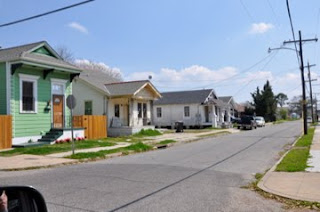So what does this mean? First, it now seems unlikely that a substantial number of families or individuals that have relocated are likely to come back now. All the money used to bring people home has been distributed and the insurance money has now all been paid out. However, while many have settled away from the city, many may be located in the surrounding suburbs. It will certainly be interesting to see how the population of the New Orleans metro area has changed over the last 5 years.
Why haven't people come back to the city? Well, for a lot of folks, the allure of New Orleans was not gumbo or jazz, but cheap housing. Housing in New Orleans was, in many places, renting for rates that are not sufficient to fund new construction. Moving elsewhere is simply a better deal.

But this leaves the city with a very big problem. I spent a couple of hours driving around the Lower Ninth Ward this past week and I can report that east of the industrial canal where the flooding was so bad, maybe 15% of the houses are occupied. In some areas it is about 30% while in others less than 5%. If the return migration is over, then someone has to figure out how to deal with hundreds of acres of land now occupied with a rural density level. It looks like the streets and services are all still there so turning the remaining area into a park will be expensive... as will be an agricultural use. Could the lots be bought and then sold to a large scale housing developer who could get the cost of construction way down by building 1,000 units? Anyway this goes, it won't be easy... but it will be big.

